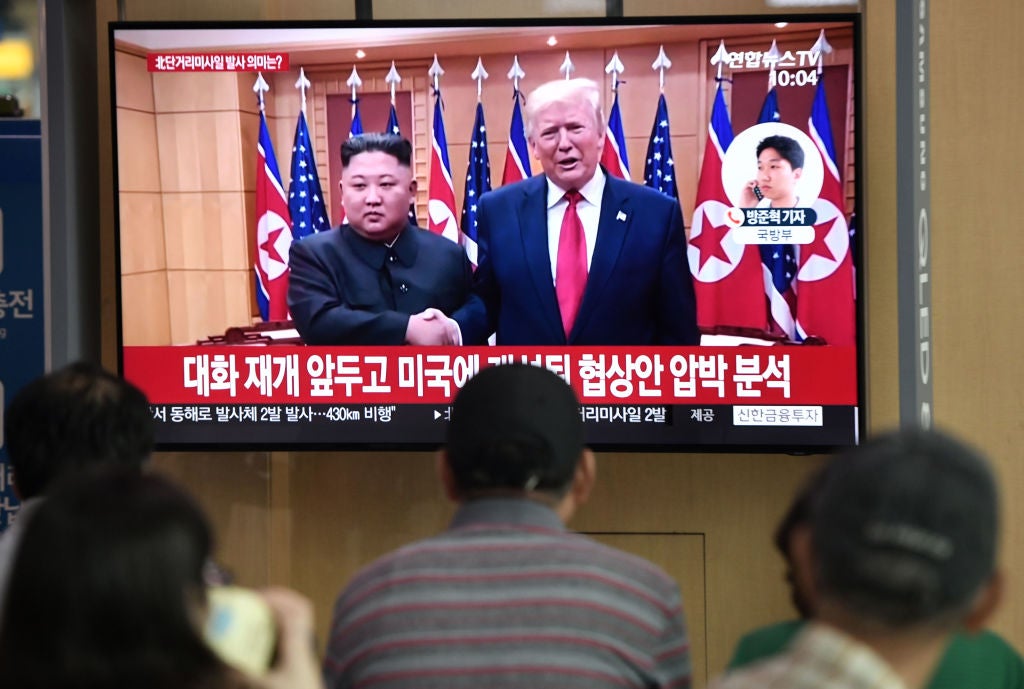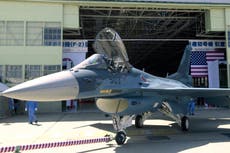What next for North Korea? Kim Jong-un set to be an early foreign policy headache for Joe Biden
Advice, not instinct, will govern US president-elect Joe Biden’s policy towards North Korea, but a change in emphasis won’t mean fewer problems, reports Donald Kirk in Seoul

The rise of president-elect Joe Biden comes at the worst moment for North Korea’s Kim Jong-un as he battles increasing hunger and poverty among his own people, as well as allegations that he refuses to acknowledge a Covid-19 pandemic in his country.
“It means he’s never going to hold another fruitless summit again," said Shim Jae-hoon, an analyst at Yale Global.
To the dismay of Kim, as he contemplates whether to greet Mr Biden’s victory with another fusillade of missile launches, the president-in-waiting is expected to look for advice not to his gut instincts – as Trump did – but to advisers who are likely to urge a go-slow approach while demanding that Kim begin to dismantle his nuclear programme.
Mr Biden “will reinvigorate US alliances as a part of overall US standing in the world,” said Victor Cha, who advised on Korea for the White House National Security Council during the presidency of George W Bush from 2000 to 2008.
Cha predicted Mr Biden “will say all of the right things about how allies make us stronger, not weaker, and that we share not just common interests but common values".
But if it is not good timing for the North Korean leader, that doesn't mean the problems are all going to be one-way. Mr Biden will soon find he has inherited problems from his unpredictable predecessor.
One of the first decisions for Mr Biden, said Cha, will be to complete talks with South Korea on how much the South should pay to keep US bases and 28,500 troops in the country. Talks stalled after outgoing President Trump demanded $5bn (£3.8bn) a year, more than five times the $927m (£721m) the South forked over last year. Cha also said the US and South Korea might resume joint military exercises that Mr Trump cancelled without informing his defence secretary.
Cha fears, though, that Kim might test Biden’s determination by resuming missile tests. Kim has ordered a number of tests of mid-to-short range missiles since the Singapore summit in 2018, but has not tested an ICBM, intercontinental ballistic missile, since November 2017. Nor has North Korea exploded a nuclear warhead since its sixth underground test in September of that year, after which Trump reversed his tough stance against Kim, whom he had denounced as “rocket man” in the UN.
“I worry that they will test something early on as an intended sign of strength,” said Cha, “but that would only shape a policy review in the administration towards more pressure and sanctions.”
Bruce Klingner of the Heritage Foundation shares similar concerns. “North Korea has historically ramped up tensions early in a new US and South Korean administration to, in the words of a North Korean defector, ‘train them like a dog’ and induce concessions,” he said.
“Provocations could include the initial launch of the new ICBM revealed in North Korea’s 10 October parade or another nuclear test. Such blatant violations of UN resolutions could be one of the Biden administration’s first foreign policy crises.”
Klingner predicted that Mr Biden would adopt an almost centrist approach of “policy over personality". Mr Biden, he said, “has articulated a comprehensive, if vaguely defined, policy for achieving North Korean denuclearisation and preventing proliferation” in which “much remains uncertain, including the parameters of an acceptable denuclearization as well as how strongly Biden will enforce US sanctions laws".
A clue to how he might act will be his time as vice-president. Then, during the eight years of Barack Obama's presidency, the US “engaged in timid incrementalism in sanctions enforcement", said Klingner.
Steve Tharp, who’s studied North Korea for decades as an army officer and civilian expert with the US command, was not too optimistic. “We will see a return to many of Obama's policies when it comes to the Korean peninsula,” he said. “Remember, that's the framework that Biden probably sees it in. We'll likely have a new kick-the-can-down-the-road policy” in which “a lot of the same advisers under Obama return".
As for North Korea’s response, Scott Snyder of the Council on Foreign Relations predicted that North Korean policy might emerge during the eighth congress of the ruling Workers’ Party, which by coincidence will be held shortly before Biden’s inauguration on 20 January.
“I am inclined to downplay the possibility of provocations until then,” said Snyder, “despite the emphasis on further demonstrations in the past pattern of North Korean behaviour coinciding with other US leadership transitions."
South Korea, stymied in attempts to reopen stalled talks with the North, remains fearful of a return to hardline military confrontation. President Moon Jae-in, anxious to cut a deal with the North that would formally end hostilities dating to the Korean War, should be among the first foreign leaders whom Mr Biden receives in the White House.
Moon’s concerns were evident in comments from Lee In-young, minister of unification in charge of the South’s dealings with the North.
Lee warned it would not be “a desirable choice at all if North Korea creates or escalates tension on the Korean peninsula to explore the intentions of the next US administration”. South Korea, he vowed, would “continue the peace process unwaveringly".
Analysts, however, doubt if Kim will negotiate away his nuclear programme despite the impact of US and UN sanctions as well as the Covid-19 pandemic that has forced him to close his borders with China, on which the North depends for all its oil and half its food.
Fundamentally, I don’t think the US government fully understands the problem with North Korea.
China’s President Xi Jinping has been lavishing praise on the alliance with North Korea, claiming victory in the Korean War after sending troops into the North 70 years ago to rescue the communist regime led by Kim Jong-un’s grandfather, Kim Il-sung. Xi has vowed China would do it again in the event of a second Korean War, but Kim Jong-un’s power may have weakened during the Covid pandemic. Kim steadfastly refuses to acknowledge the spread of the disease among his own impoverished people, stifling movement inside North Korea and welcoming advice from the World Health Organisation.
“Biden will push working-level nuclear weapon negotiations with North Korea,” said Bruce Bennett, a long-time North Korea watcher at the Rand Corporation, “but fundamentally, I don’t think the US government fully understands the problem with North Korea.” Kim Jong-un, he said, “is desperate to establish a position of power and influence for himself” and “nuclear weapons are a key legacy of his father and grandfather”.
Kim, as a third-generation leader, “has made it clear that he views nuclear weapons as key to his survival,” said Bennett. “I believe he is pursuing not just tens of nuclear weapons but hundreds.”
Evans Revere, a long-time senior US diplomat with expertise on Korea, agreed, more or less agrees. Biden “faces a tough situation,” said Revere. “Denuclearisation is now an almost unattainable goal. Kim Jong-un believes more strongly than ever that nuclear weapons guarantee his regime's survival.”
Trump, he said, had “looked the other way as Pyongyang has expanded and enhanced its nuclear weapons capability, and done the same with its ballistic missiles” while defining “success” for his North Korea policy as simply “the absence of war” and the North’s “self-declared moratorium on nuclear weapons and long-range missile testing in place” as “denuclearising".
“Trump has been prepared to ignore the fact that the DPRK is a greater nuclear threat to the United States and its Asian allies than it was four years ago,” said Revere. “He has teed up a policy that essentially accepts North Korea as a permanent nuclear power.”
Join our commenting forum
Join thought-provoking conversations, follow other Independent readers and see their replies
Comments


Bookmark popover
Removed from bookmarks